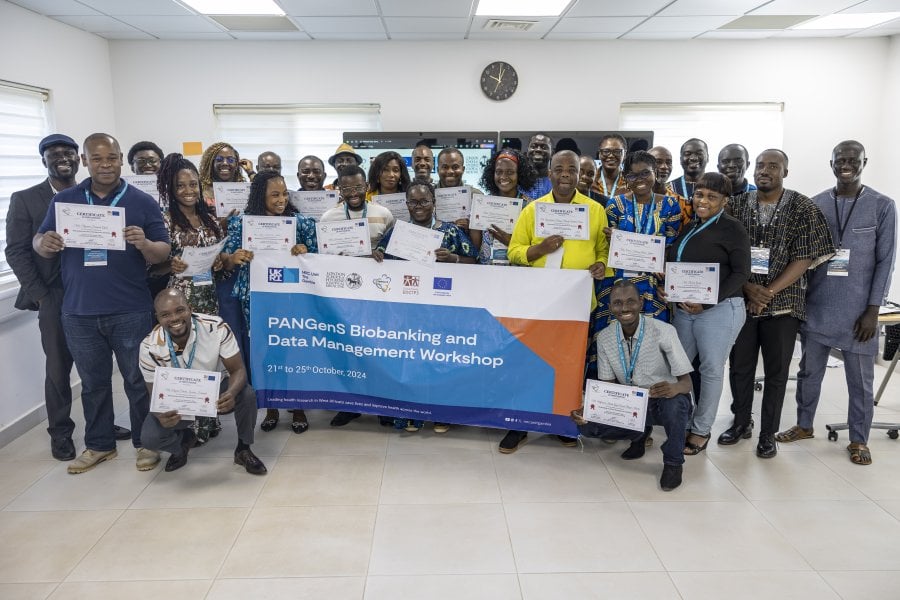
Organised in collaboration with the Pan-Africa Network for Genomic Surveillance of Poverty Related Disease and Emerging Pathogens (PANGenS), the training is funded the European & Developing Countries Clinical Trials Partnership (EDCTP3).
With 26 researchers from 12 African countries, the workshop was aimed at enhancing the skills of researchers, enabling them to better understand key ethical principles and legal regulations governing biobanking, ensuring responsible research conduct and protecting participants’ rights.
Speaking at the opening ceremony, Dr Davis Nwakanma, Chief Operations Officer at MRCG at LSHTM, encouraged participants to make the most of their time . “We take pride in our commitment to scientific advancement, which extends beyond The Gambia. It is a pleasure to welcome participants from across the continent,” he remarked.
Professor Assan Jaye, Head of Research Training and Career Development at MRCG at LSHTM, highlighted the Unit’s dedication to supporting, scaling up, and enhancing research quality. “Our goal is to foster collaboration and provide platforms for researchers. We serve as a hub for emerging talent and offer valuable networking opportunities,” he emphasised.
Reiterating this commitment to develop capacities across the continent, Dembo Kanteh, Head of Strategic Partnerships at MRCG at LSHTM, underscored the significance of partnerships in advancing the science. “We prioritise external partnerships in our capacity development programs. We also endeavour to promote collaboration through grant applications. PANGenS is a manifestation of such collaboration” he highlighted.
Professor Alfred Amambua Ngwa, the Lead Investigator for the Malaria work package of PANGenS at the MRCG at LSHTM, highlighted that PANGenS is designed to foster such cooperation, with one key approach being the collection and sharing of data and samples.
Jaimito Rodrigues Herculano, a participant and an Administrative Technician at the Instituto Nacional de Saúde (INS) in Mozambique, recognised the significance of the training as an opportunity for the acquisition of knowledge and skills necessary to manage the interlaboratory sample referencing system, and to support the organisation of a robust sample conservation system within biobanks. He commended MRCG for creating an environment that offers facilities, equipment, systems, and working conditions that are environmentally friendly and safe for the health of employees, visitors, and the public.
Amy Dziedzorm Dzadey, a participant and Research Assistant under the PANGenS Tuberculosis work package at the Noguchi Memorial Institute for Medical Research (NMIMR), University of Ghana (UG), said; “This training has deepened my appreciation for knowledge sharing and collaborations. It has equipped me with knowledge, and skills essential in ethical and regulatory issues concerning health research data, proper data management and the concept of biobanking for public health impact and disease surveillance and epidemic preparedness.”
PANGenS is a consortium of scientists from public health institutions in three European countries namely Germany, Netherlands and Switzerland and 12 African countries, namely Ghana, Nigeria, South Africa, Togo, Benin, Sierra Leone, The Gambia, Liberia, Tanzania, Namibia, Mozambique and Gabon. It is hoped that this training will boost standards excellence in research.
LSHTM's short courses provide opportunities to study specialised topics across a broad range of public and global health fields. From AMR to vaccines, travel medicine to clinical trials, and modelling to malaria, refresh your skills and join one of our short courses today.
